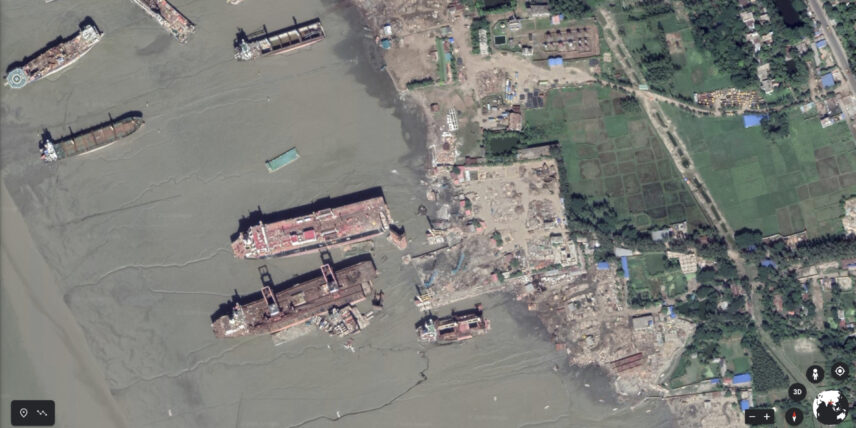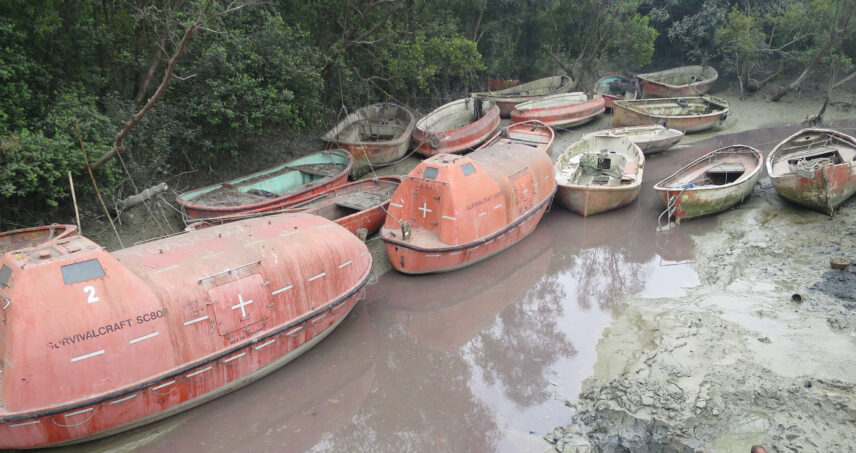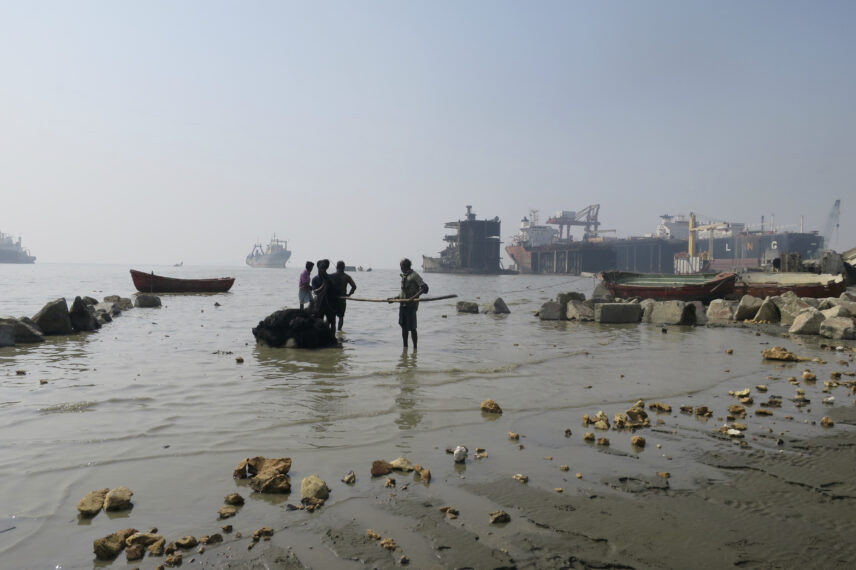Article begins
Bangladeshi workers “cut” through ships run aground on intertidal beaches with hand-held gas torches. Workers often climb to great heights in order to dismantle these oceangoing giants, with massive tonnages of steel falling into the seabed, creating such sounds and vibrations that my interlocutors living between the shipbreaking yards referred to them as “earthquakes” (bhumikompo).

It was hard to gain access and insight into the ship industry when I first visited in the winter of 2019–2020, just before the COVID-19 pandemic hit. Shipbreaking not only satisfies 80 percent of Bangladesh’s national demand for steel used for infrastructure development and construction but also contributes to several local ancillary industries, such as steel re-rolling and scrap recycling, that employ many workers. The economic significance of shipbreaking means that national and international NGOs seeking to ban the industry in Bangladesh remain unpopular. During my fieldwork in 2020, shipbreaking yard owners were wary of foreigners (particularly journalists, NGOs, and researchers) and their use of images of shipbreaking to raise awareness outside of Bangladesh of the spectacular violence and environmental pollution it causes. Such negative attention on Bangladesh’s shipbreaking was seen to undermine national efforts to upgrade shipbreaking on beaches to a “sustainable” ship recycling industry.
At the time, the Ministry of Industries and the government of Bangladesh were seeking to reform the country’s shipbreaking industry so that Bangladesh would be in a position to ratify the 2009 “Hong Kong Convention for Safe and Environmentally Sound Ship Recycling” (HKC) by 2023. This would allow Bangladesh to compete with HKC-compliant yards in Alang, India, and ensure that ships continue coming to Bangladesh. The owner of Bangladesh’s only HKC-compliant ship recycling facility at the time also made it clear that he wanted to show “foreigners” that Bangladesh can maintain international labor and environmental standards and is neither backward nor primitive.
Yet, in 2020, much work remained to be done to improve labor and environmental standards as per the HKC. Shipbreaking yards, once open to prying passers-by, were now gated and guarded from unauthorized (foreign) visitors. I had to seek approval from owners of ship recycling facilities to access these sites. I also relied on field assistants. One of them, “Rahim,” was a young shipbreaking worker living close to the yards in Sitakunda. He took me to see the homes of shipbreaking workers and their families, to abandoned yards with their oiled and dirty beaches, and to the villages of Hindu Zele fishermen caste located between Sitakunda’s shipbreaking yards.
Rahim’s whole family was in one way or another tied to the shipbreaking industry. His father, “Kazi,” had suffered a debilitating accident and lost his main source of income. For almost five years, Kazi had been caught up in court cases trying to obtain hospital treatment and compensation from the subcontractor who had hired him for the shipbreaking yard where the accident happened, to no avail. Rahim himself dreamed of college, but after his father’s injury, the responsibility to earn an income to support the family fell on him. He became a “helperi,” an assistant that holds gas cylinders and helps the “cutterman” that uses acetylene torches to “cut” through steel. The subcontracting system allows yard owners to skirt responsibilities and the many labor standards regulating shipbreaking since it became a formal industry in 2011, with even more stringent controls since the 2018 Bangladesh Ship Recycling Act. Several workers I spoke to felt that there was more focus on “occupational safety and health” with personal protective equipment, but that the main risk came from the time pressure to quickly dismantle ships so that the yard owner could sell steel and make profits in order to repay rising interest rates quicker. Migrant workers often take the riskier jobs and may miss out on both official training and labor documentation entitling them to work-related compensations. They often come from ethnic minority groups, such as adivasi Chakma-people from Bangladesh’s northeast, who are discriminated against even by the NGO workers and trade unionists meant to protect their labor rights.
In contrast to the Bengali Muslim shipbreaking workers like Rahim’s family, Hindu-minority Zele fishermen are not employed in the industry and live in villages in between shipbreaking yards. The settlement where Nikhil Kaka, a 60-year-old Zele fisherman elder, lived comprised homesteads of cracked mud and sheds made out of cement bags and sticks.

Powders and fibers coming from dismantled sea vessels were scattered around the village and caused fever and coughing, Nikhil Kaka explained, while toxic residues such as crude oils and other pollutants in the water harmed the fish they continue to depend on for their living. The representatives of the state and ship recycling companies with whom I spoke dismissed the concerns of these Zele fishermen as irrelevant precisely because they did not work in the industry. Landless tenants and a low-income Hindu minority, they lack the social connections and economic leverage to have any political voice.
Attempts to form trade unions here are usually fragmented and yard-based and do not amount to uniting workers across the industry. The practice of hiring workers in different work-package groups under different subcontractors for each new ship undermines collective self-organization. Only foremen and management staff at the yards are permanent employees. The rest tend to get jobs based on connections with subcontractors. Seeking to implement the HKC, the Ministry of Industry has pushed for the certification of trained shipbreaking workers with the goal of creating a permanent workforce registered in a digital database where ship recycling yards could directly employ skilled workers. By 2023, workers have been trained, but the creation of a database and discussions of a permanent workforce have come to a halt. Hopefully, this will not be part of what the locals call natok: the “theater” that plagues labor and work-environment inspections in Bangladesh’s industries, where inspectors often do not speak to workers themselves and are said to take bribes for allowing shipbreaking yards to continue operating.
Since trade unions are weak and organized along political party lines in what is increasingly referred to as a one-party state, organizing shipbreaking workers has a long way to go. While there are NGOs that train workers on occupational safety and health, none would talk about strikes and collective action to improve the industry. Rather than coming from trade union bargaining, the shift from barefooted child laborers to adult shipbreaking workers wearing personal protective equipment happened only after an appeal made by the Bangladesh Environmental Lawyer’s Association (BELA) on the environmental and work-related hazards of shipbreaking. The changes took place as late as 2011. Back then, the Bangladesh High Court issued a suo moto rule (i.e., out of its own accord), directing the government of Bangladesh to halt all shipbreaking within Bangladesh and ban importing ships for breaking. This was petitioned by the Bangladesh Ship Breakers Association, who were able to import ships again as long as they were not uncleaned oil tankers with nuclear residue.

This resulted in shipbreaking becoming a state-regulated industry that must follow the 2011 Ship Recycling Rules aimed at improving labor and environmental conditions. BELA, however, are not popular in Sitakunda and do not have a field office there. They are allies with the Brussels-based NGO Shipbreaking Platform that wants to ban beaching and end shipbreaking in Bangladesh due to its toxic environmental consequences. Certain local NGOs and former activists have distanced themselves from the Shipbreaking Platform (while the NGO states that they no longer work with certain people due to malpractice); potential alliances between workers and environmental activists have been disrupted.
The labor of living with toxic development captures how shipbreaking workers and fishermen and their families in Sitakunda are made ill by the very industries ensuring national economic growth. The economic importance of these polluting and risky activities risks undermining regulatory efforts and stifles effective organization of unions to protect workers. This has further been exacerbated by NGOs seeking to end shipbreaking altogether and thus not joining forces with those seeking to improve labor conditions and environmental protections through HKC-compliant ship recycling facilities. Increasingly, workers themselves look to the changes in Bangladesh’s garment industry for a way to improve shipbreaking workers’ rights, and perhaps this may hold some future hope for labor mobilization in Sitakunda too.
Taras Fedirko and Whitney Russell are section contributing editors for the Association for Political and Legal Anthropology.

